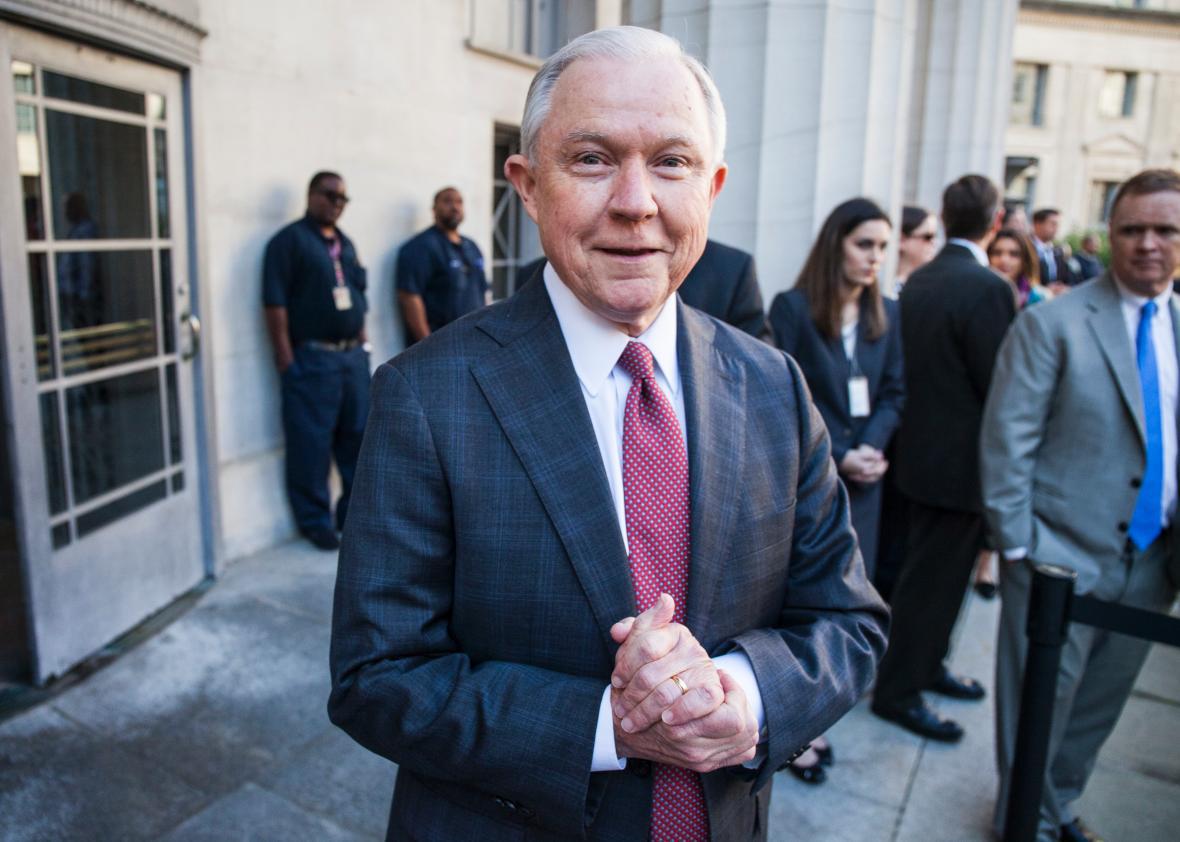Over the last eight months, the Trump administration has launched an assault on voting rights designed to limit access to the ballot. Attorney General Jeff Sessions’ Justice Department has defended voter ID laws and state efforts to purge voters from the rolls, and the president’s voter fraud commission has peddled falsehoods to lay the groundwork for a rollback of voting rights laws. This month, the administration has urged a court to strip voting rights from an entire class of people.
This latest gambit involves the rights of United States citizens who relocate from a state to a U.S. territory. Under the Uniformed and Overseas Citizens Absentee Voting Act (UOCAVA), states must allow citizens to vote by absentee ballot in federal elections when they relocate anywhere outside the U.S. The law is meant to be global, even cosmic: Citizens retain their right to vote absentee for federal offices if they move to a foreign country, a research station in Antarctica, or the International Space Station. But bizarrely, the statute does not require states to let citizens vote absentee if they move to four U.S. territories: Puerto Rico, the U.S. Virgin Islands, Guam, or American Samoa. It does compel states to let citizens vote absentee if they move to a fifth permanently inhabited territory, the Northern Mariana Islands.
In 2015, Illinois residents who relocated to several of these disfavored territories filed a lawsuit challenging this limitation as an equal protection violation. They argued that the UOCAVA arbitrarily limits their right to vote in federal elections. (U.S. territories do not receive full representation in Congress and may not vote for president.) By protecting the absentee voting rights of residents of the Northern Mariana Islands but not those who live in other U.S. territories, the plaintiffs argued, the UOCAVA irrationally discriminates against certain territorial residents in violation of the Fifth Amendment. The only solution is to extend absentee voting rights to residents of every U.S. territory.
The Justice Department began defending the UOCAVA during the Obama administration, and won at the district court level. It’s perfectly acceptable for the DOJ to defend a bad federal law—that’s its job—and the agency maintained its position on appeal under Sessions. But in September, the DOJ unexpectedly took an aggressive new stance. In a letter filed with the 7th U.S. Circuit Court of Appeals, the DOJ argued that, if UOCAVA infringes upon equal protection, the proper remedy is to strip the absentee voting rights of residents of the Northern Mariana Islands, not to extend them to all territorial residents.
This extreme remedy, the Justice Department claimed, would be mandated by the Supreme Court’s recent decision in Sessions v. Morales-Santana. That is absurd. It is true that, in Morales-Santana, the court struck down a statute granting favorable treatment to mothers rather than expanding favorable treatment to fathers. But that is because the unconstitutional provision providing favorable treatment to mothers was an exception to the broader rule. Here, the disfavorable treatment of some territorial residents is the exception to the broader rule of global absentee voting rights. And in such situations, the Morales-Santana court explained, “extension, rather than nullification, is the proper course.”
I asked Neil Weare, president of the We the People Project—which brought this litigation—what he made of the DOJ’s letter. “As far as we can tell,” he told me, “no court has ever taken away voting rights to remedy an equal protection violation. It would be unprecedented.”
The Justice Department’s defense of UOCAVA may have some specious appeal. In effect, the DOJ asserts that the law was designed to preserve Americans’ voting rights when they move out of the country. But since territories like Guam and American Samoa are part of the United States, this argument goes, residents should have to register there instead of voting absentee in their previous states.
That argument cannot withstand scrutiny under Morales-Santana for several reasons. UOCAVA pertains exclusively to federal elections: A citizen living in Puerto Rico—which has no electoral votes and no voting representatives in Congress—has as much federal representation as a citizen living in Portugal unless she can vote by absentee ballot. The law was designed to protect citizens’ right to federal representation when they would otherwise lose it. But that goal is undermined by the statute’s territorial carve-out, which means this carve-out must therefore be seen as an exception to UOCAVA’s general rule. In Morales-Santana, the Supreme Court said disfavorable exceptions can be rectified by extending equal treatment. Here, that would mean allowing all territorial residents to vote absentee, not taking away more citizens’ federal representation.
Weare told me that the NMI government encourages relocated mainlanders to vote absentee. It would be yet another blow to Americans’ voting rights if a court were to deny them the federal representation they currently enjoy. This issue might seem minor—but it demonstrates the Trump administration’s zeal to marshal any arguments it can to disenfranchise Americans. In Sessions’ Justice Department, less voting is always preferable to more. And this small conflict provides a disturbing preview of the much bigger voting rights battles ahead.
